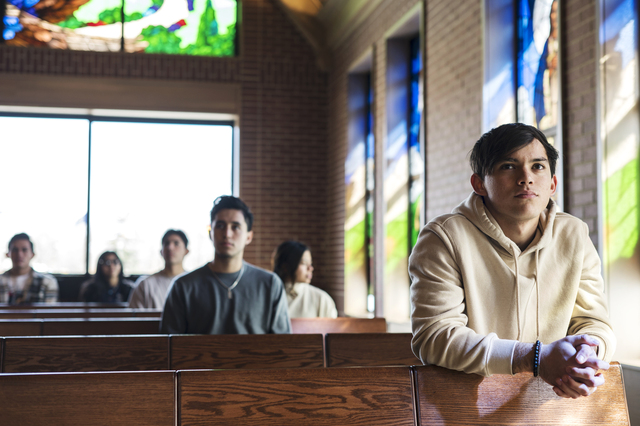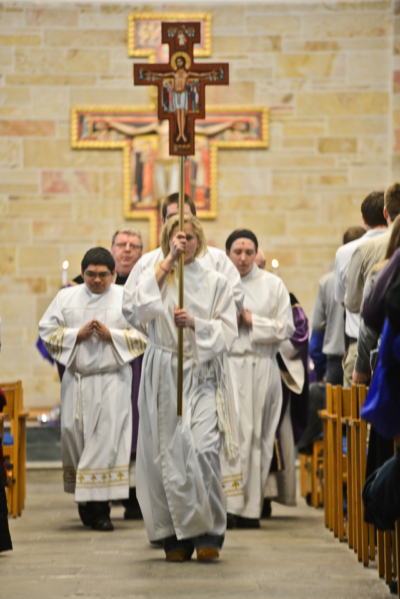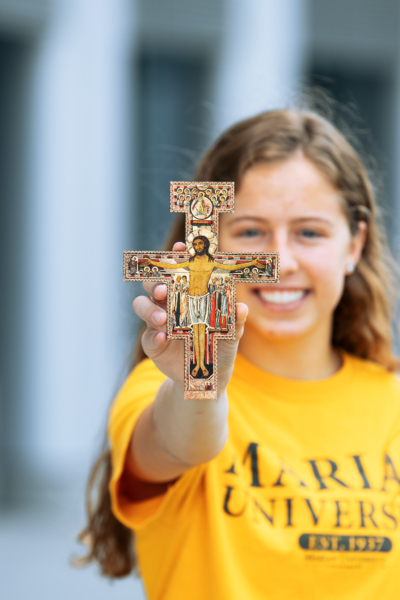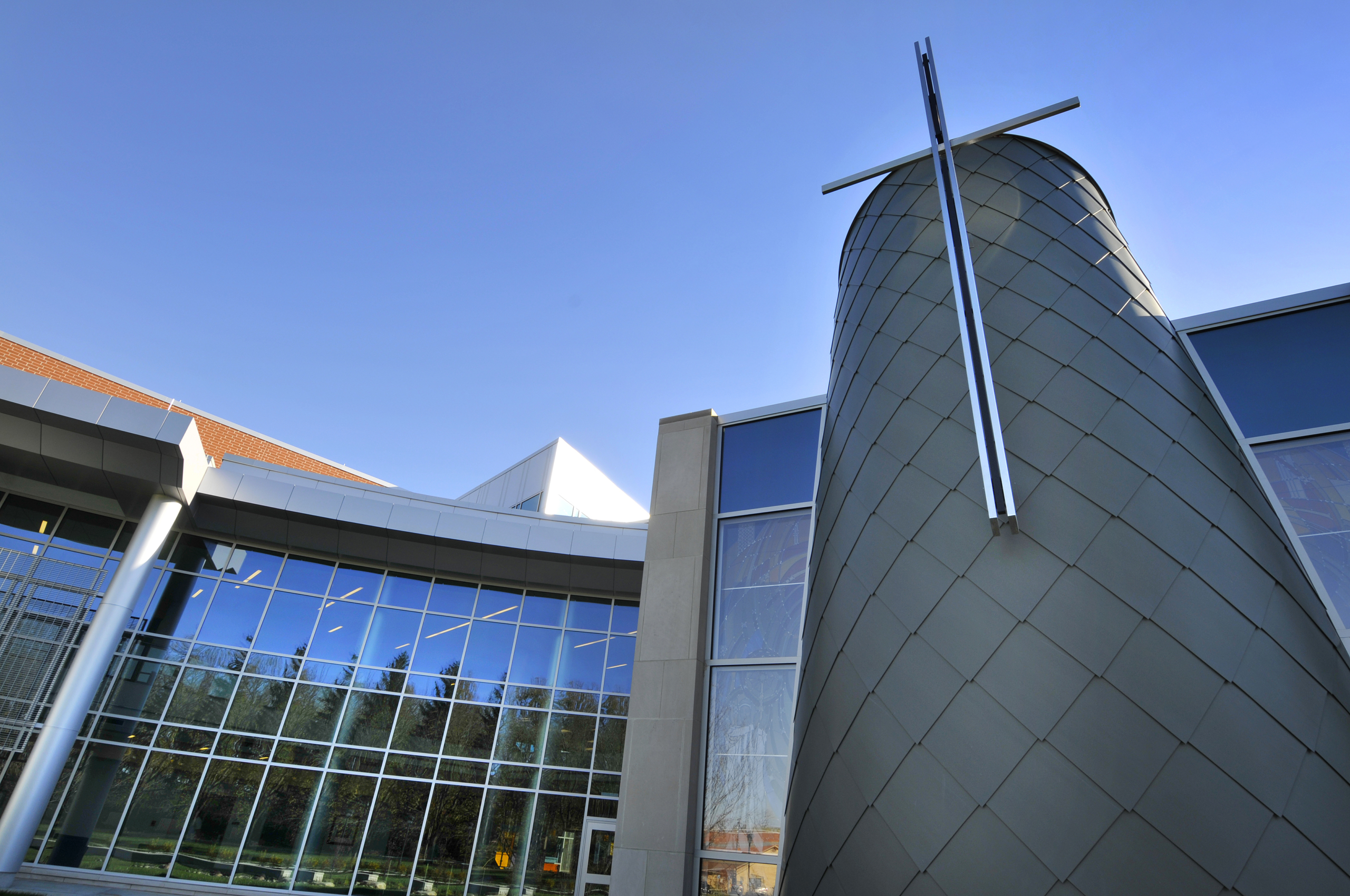
Darrion McAlister (’18) at mass. Darrion now works at Marian University as an Academic Success Coach for Student-Athletes
Last year, Marian University of Indianapolis launched Moral Capitalism, an annual three-credit course that teaches the historical framework of capitalism and Catholic teachings.
Many, when hearing the phrase “Moral Capitalism,” ask if it is an “oxymoron.” The reality is that they are intertwined. Capitalism, especially moral capitalism, has lifted more people out of poverty over the past two centuries than any other economic system in the world.
Marian’s Moral Capitalism course is designed to make a societal impact under the lens of Marian’s Franciscan Sponsorship values, which celebrate the dignity of the individual, peace and justice, reconciliation, and responsible stewardship. That had great appeal to Joseph Jacobs (’26), a Finance major.
“Moral Capitalism positively impacts society by understanding and valuing all aspects of the individual and the greater good, even when it is hard.”

Marian students serving mass
SHARING A VISION
As part of the coursework, students organize into teams and are assigned to create a hypothetical corporation, where they are the CEOs, and define their corporation’s mission and values. A final report challenges students to reflect on how the course content altered, influenced, and impacted their perspective on leading their corporation.
One distinctive feature of the course is the creation of a Moral Leadership Lab, which connects ten community leaders to students throughout the semester. Fall ‘22, speakers included: Carolyn Woo, Ph.D, Former Dean, Mendoza College, University of Notre Dame; Joe Reitz, 2016 Indianapolis Colts Walter Payton Man of the Year; Mark Caswell, CEO of Resultant; and Father Cole Daily, Assistant Pastor, St. John Vianney Catholic Church, Fishers, IN.
In the class, Father Daily presented “The Catholic Moral Vision”, which shares biblical scripture that illustrates a vision of the world that pertains to building a successful society today. He shared with students that God created a good world, one with purpose and a meaning. All reality is a gift that is entrusted to us, Father Daily explained. People find freedom by living for the greater things. Money and possessions are good, he admitted, but they are to be used with gratitude and responsibility. In the end, the greatest joy comes from giving.
Father Daily also discussed conscience, the common good, charity, and human dignity in the Moral Capitalism course. These themes were expanded upon during the lecture by Father Coley Daily. “The topic of this course is not only timely, but necessary for a proper human formation,” Father Dailey noted. “I was edified to see students appreciating the merits of capitalism and also working to understand how it can be practiced ethically to promote the flourishing of humanity.”

Student displaying San Damiano cross
ANSWERING CAPITALISM’S CRITICS
Despite the positive economic impacts of capitalism, there are critics. Most of the criticism of capitalism comes from individuals who base their opposition solely on the greed of individuals who manipulate the capitalistic process to increase their personal wealth and stature at the expense of others. This is immoral and has led some to consider alternative economic systems such as socialism.
The critiques of capitalism are also addressed in the Moral Capitalism course. Because of his influence to end communism in Poland, St. John Paul II viewed socialism as a dehumanizing construct that stripped men and women of their free will. “Socialism considers the individual person simply as an element, a molecule within the social organism, so that the good of the individual is completely subordinated to the functioning of the socio-economic mechanism,” he explains.
Further in Centesimus Annus (1991), St. John Paul II writes, “A person who is deprived of something he can call “his own”, and of the possibility of earning a living through his own initiative, comes to depend on the social machine and on those who control it. This makes it much more difficult for him to recognize his dignity as a person and hinders progress towards the building up of an authentic human community.”
Milton Friedman, a leading economist and champion of the free markets, echoes Pope John Paul II’s optimism. In Capitalism and Freedom – another text studied in Moral Capitalism. Friedman states: “Fundamentally, there are only two ways of coordinating the economic activities of millions. One is central direction involving the use of coercion – the technique of the army and of the modern totalitarian state. The other is voluntary co-operation of individuals – the technique of the marketplace.”

Chapel at the Michael A. Evans Center for Health Sciences at Marian University
IT’S NOT ENOUGH TO BE GOOD
Overall, the course examines how morality applies to the corporate world. To do that, students learn how capitalism has contributed to human empowerment and prosperity, including a look at capitalism’s societal advantages and disadvantages. At the same time, students are introduced to the facets of moral capitalism that balance Christian principles with commercial necessities.
Notably, the course covers Adam Smith’s Theory of Moral Sentiments and The Wealth of Nations, excerpts from Milton Friedman’s Capitalism and Freedom, Great Britain’s influence on the Rule of Law, Papal Encyclicals Rerum Novarum and Centesimus Annus, and case studies on both moral and immoral capitalism. Along with making connections with leaders through the Moral Leadership Lab, students attend one meeting at the Catholic Business Exchange of Indianapolis, which is a group of 150 business leaders who celebrate business and faith.
What is the big takeaway from the course? Liam Begley (’26), a Finance major, learned a simple rule to weigh actions in a moral context. “I gained a greater understanding of the importance of ethics and morality in my future career. I learned that doing good things is not the same as doing the right things.”
For Carolyn Woo, the former dean of Notre Dame’s Mendoza College, the course provides an essential link between practicing faith and pursuing business.
“The course on Moral Capitalism challenges a pernicious casual characterization of business as a “necessary evil”.” Business is a “necessary good” if conducted with the right ethical energies for the right ends. This course unpacks Catholic Church teachings on the potential of business to foster human dignity, enable the expression of human creativity, and create products and services that serve people and communities.”
DON’T MISS: MARIAN UNIVERSITY: A 2023 UNDERGRADUATE BUSINESS SCHOOL TO WATCH











Questions about this article? Email us or leave a comment below.